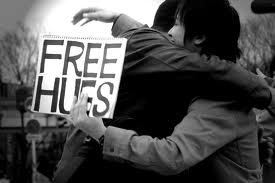Seventeen-year-old high school senior, Sam McNair’s hopes for attending college next year came crashing down this week. Bad grades? Drugs? Weapons? No, McNair hugged his teacher and received a one-year suspension for sexual harassment. His alleged harassing hug was captured on surveillance video, and it looks pretty innocent to me. Although, McNair’s teacher alleged his cheek and lips touched her neck, he denies any such contact. McNair’s mom says their family always hugs, and McNair insists he was just trying to brighten the teacher’s day.
Sexual harassment allegations against students are not uncommon. Last week, Hunter Yelton, a 6-year-old boy was suspended by a Colorado school for sexual harassment – he kissed a female classmate on the cheek. The boy’s mother said the two children liked each other, and that the kiss was not unwelcome. Should children be charged with sexual harassment?
Courts have found that, just as Title VII of the Civil Rights Act protects the workplace from sexual harassers, sexual harassment at school is prohibited by Title IX of the Education Amendments of 1972. Although Title IX is typically invoked in connection with equality in men’s and women’s school sports activities, more recently it has been used to ensure that a school provides an environment that is free from sexual harassment.
As a result, small children are now facing accusations of sexual harassment. Another 6- year old boy was found in violation of the school’s sexual harassment policy when two of his fingers reached under a female classmate’s waistband to touch the skin of her back. The principal suspended the boy from school for three days for violating the school’s sexual harassment policy. In a newspaper interviews the boy’s mom said he is too young to understand what the word ‘sexual’ means. When a nine-year-old in North Carolina was suspended for calling his teacher “cute,” the principal labeled this behavior sexual harassment.
I get that McNair’s teacher doesn’t want to be touched by her students, and she probably wants McNair to learn boundaries. I’m certainly not suggesting she should tolerate behavior that she finds offensive. So let’s teach him some boundaries. But labeling McNair’s behavior sexual harassment and suspending him for a year just doesn’t make sense.
For sexual harassment in the workplace, the Equal Employment Opportunity Commission (EEOC) definition includes “unwelcome sexual advances, requests for sexual favors, and other verbal or physical harassment of a sexual nature.” But on its website, the EEOC clarifies that “the law doesn’t prohibit simple teasing, offhand comments, or isolated incidents that are not very serious. Harassment is illegal when it is so frequent or severe that it creates a hostile or offensive work environment or when it results in an adverse employment decision (such as the victim being fired or demoted).”
But school is not like the workplace, and applying a term intended for the workplace to label behavior in elementary or high school is just plain misleading. High schools often encourage dating between students, while workplaces typically frown upon dating a colleague. At school-sanctioned dances and proms, students grasp their dates in a hug-like embrace while slow dancing. Again, doesn’t happen so much in the working world. Welcome behavior becomes somewhat more murky in this environment. The definition of sexual harassment at school would have to differ significantly from that of harassment at work.
I propose we discard the “sexual harassment” label in school for something more appropriate like “unwelcome contact.” Not only does this label fit the behavior more appropriately, but it won’t lead to confusion about what constitutes sexual harassment when the children later enter the working world.
On a brighter note, after a barrage of media attention, the Colorado school dropped the sexual harassment accusations against Hunter Yelton (the 6-year-old who kissed a classmate last week). His behavior was much more appropriately re-labeled “misconduct.”
As for McNair’s year suspension, I hope his school also recognizes that the punishment needs to fit the crime. Good luck Sam!

